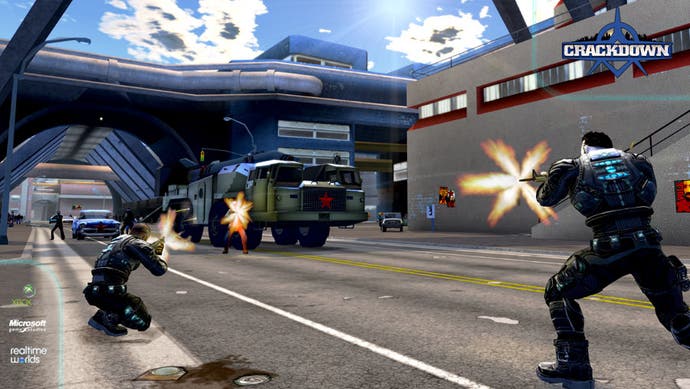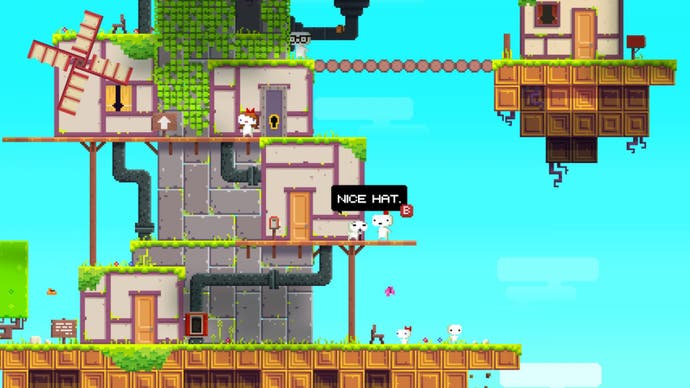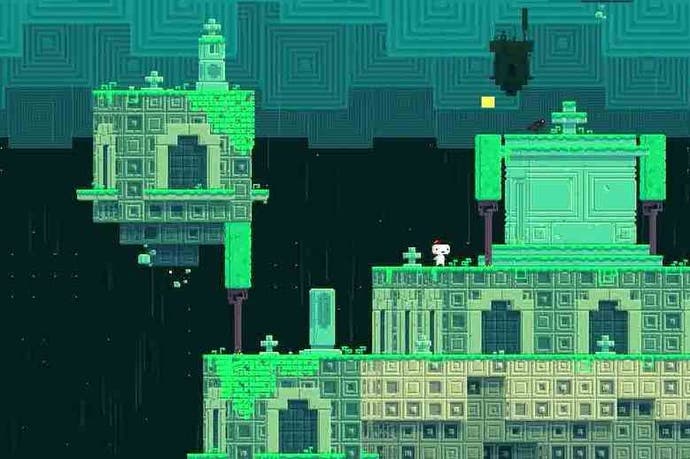The secret ingredient that unites Dark Souls, Crackdown, Zelda and Fez
Write to memory.
The first games I played were games of memory. My English grandfather was full of them. Parlour games, mainly. There was one in which each chair in his living room became a station and his family became trains. He would stand in the middle of the room and direct the trains between the stations, and you had to remember which train you were and where the station you were headed to could be found. At five or six, I found it overwhelming, but also intoxicating. (At 39, I now look back and suspect my grandfather wished he hadn't spent his life as clerk of the local magistrate's court.) Then there was another game - I've since learned that it's called Kim's Game, but as a kid I assumed my grandfather had invented it - in which he arranged a tray with bits and pieces from around the house, gave us a minute to study them all and then covered the tray with a cloth and quietly removed one item. When he uncovered the tray again we all had to spot what was missing.
God, memory is just fascinating. At times - these times may be called "the speedy approach to being 40" - it feels like memory is the most human of topics. It's where so much of what we are lays tangled together. Tangled and knotted. I think of Kim's Game and I am instantly back in my grandfather's living room. I can remember so many of the items that served time on the Kim's Game trays - a silver toast rack, a plectrum, a music box with a clown printed on it, a bright purple brazil nut chocolate - and then these items bring their own memories along with them too. I remember looking at that plectrum and wondering what it was for. I think of the toast rack and I can almost smell the gas hob and the marmalade that scented the kitchen of that house. I remember that I was allowed to eat that brazil nut chocolate once that particular game was completed.
Games and memory belong together, I think. There is the way they are stored in the mind, for starters. I tend to remember games the way I remember architecture or poetry: fragments set adrift, occasionally bumping into view, distracting and sometimes faintly troubling. Just as I remember a warm tiled corridor with iron banisters rising at the turn, or a gentleman, clean favoured, and imperially slim, I will suddenly from nowhere recall a cathedral that hangs from chains, or a cavern where visitors are intermittently crushed between slabs of disco-pink quartz. I remember pieces, and the pieces are often more interesting than the games they force me to track down. A door that held an entire ocean behind it. A book that sent me back to the start.
But what of the games that rely on memory, that actively fold it into the mix? Kim's Game is a memory game, just as Stations was. My childhood was filled with others. When we played Cluedo at our house - and my childhood had two distinct phases: we were either playing Cluedo or we had all stopped talking to one another because of cruel things we had said while playing Cluedo - my mum refused to let us use the little notepads provided for writing down people, places and things. Since Cluedo is all about people, places, and things, she was essentially forcing us to play on the hardest setting. (She never threw the pads away, of course - the waste! Instead, we used them to write shopping lists and whatnot, cat litter and cup-a-soups mingling with Miss Scarlet and the dreaded, utilitarian wrench.)
Today, though, it can seem that a lot of games do not want to rely on fragile, tricksy, human memory. The big Ubi-games, which initially feel like perfect arenas for memory - Where did I see that goat I wanted to skin? How do I start that mission I stumbled across the other day - are filled with maps that are littered with helpful icons that do the memory things for you. Narrative games contain handy diaries filled out by your character - this is always a bit creepy - presumably in moments when you have paused things to make a quick Pop-Tart. Even tricky moves - moves you were taught back at the start and may have spent fifteen hours of campaign time without employing - are often nudged back into your life with a reminder tooltip. All of this is fine - good even. And as the kind of person who regularly forgets his own postcode, these little kindnesses have probably prodded me across the finish line of dozens of games I would have crashed out of, frustrated, had they not been employed. But I feel like there are things that we lose, that we give up in the name of convenience. And it makes me cherish the games that still find a place for memory.
These are not just puzzle games that explicitly test memory, the kind of things you get in Brain Training or one of those old Xbox Live Indie Games. Take the latest Zelda, for example. Out walking in Hyrule at night I saw a lurid green dragon dancing over a bridge. I looked on the map but there was no quest marker, and I realised to my delight: Oh, I must remember this. Just like I had to remember the Ghost Ship from Wind-Waker. It was a thing to be tracked, privately, inside the game but outside of its record-taking systems. The game was putting it all on me, and promising a tantalising reward if I kept notes and played with care. Cluedo without the pads again! Playing with care!

Then there's Dark Souls, inevitably, a game in which every death is a lesson, but the kind of lesson that will never turn up in a tooltip. This is how you map Lordran, I think: you bring it to the surface in accidents and fatalities. You learn how it fits together, and ultimately how its makers like to think, by first failing to see how it fits together, by first misunderstanding how its makers like to think.
And the reward is gigantic. This is why so many of us remember Dark Souls, I guess - because to play it you must remember Dark Souls. It lingers in the memory because you are forced at all times to make it a memory. Ditto Crackdown - the first one, which didn't allow you to track where the Agility Orbs were hidden, so you had to make sure you kept track of the areas you'd already cleared out yourself. Trackdown, if you will. Man, Zelda, Crackdown and Dark Souls: there is truly a special place for a game that engages the memory as well as the imagination or the more traditional reflexes.
Finally - finally for me at least - there's Fez, and has any game put as much of a pressure on your memory in recent years as Fez? See this owl thing that you don't understand? Try to remember where you saw it. Because five hours later you're going to find another owl thing that you don't understand and there will be a chance to put them both together and emerge wiser and happier. Try to keep track of all this writing that you can't read, too. Try to listen to particular sounds, to learn the sequence of doorways studded around a cube. Oh man, it is all too much, and gloriously so.

Fez unites everything, really. It is a game about memory, and it is also a game about memory, a self-consciously Proustian attempt to recreate the games of the designer's youth, and the bottomless mysteries these games promised. They promised these things because they did not have maps filled with helpful icons, or tooltips, or heroes who kept careful diaries.
And Fez is a reminder that memory games have new challenges these days, because even if its conundrums are not tracked within the game, they were tracked and tamed - beautifully, thrillingly so - outside of the game in online spaces. Fez even foresaw this, I suspect, and realised that if it could not encourage you to work everything out yourself, it would then throw in things that truly required people to come together in order to crack. That's a brilliant response, isn't it? To acknowledge the wisdom of crowds and give them something to keep them busy.
And maybe that's the thing about games and memory: we share these memories even if we don't go online to write FAQs or update message boards. Games are often fiercely personal experiences, but those personal experiences scale. They scale across the neighborhoods and the continents, tubular lights flickering in dozens of bedroom windows as people play Fortnite, say, alone and together, experimenting, learning, and remembering.










